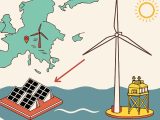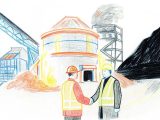
Hydrogen Fuel Cells: Hyundai’s New Ulsan Production Plant Paves Way for Zero-Emission Mobility
November 2, 2025On October 30, 2025, Hyundai Motor Company literally broke ground on a shiny new hydrogen fuel cells production plant in Ulsan, South Korea. It’s a big leap from old-school engines to a full-on embrace of zero-emission technology. Backed by a cool KRW 930 billion investment, this site under the HTWO banner is set to churn out the latest fuel cells and electrolysers, aiming for 30,000 units a year by 2027.
- Location: Heart of Ulsan’s industrial hub, on the footprint of the former engine-transmission plant
- Investment: A hefty KRW 930 billion
- Capacity: 30,000 hydrogen fuel cells annually
- Completion: Scheduled for 2027
- Applications: Automotive models, heavy-duty transport and marine markets
Strategic Shift to Zero-Emission Mobility
This isn’t just a facelift—it’s Hyundai’s play to own the clean mobility future. By swapping out an old engine-transmission site for a dedicated hydrogen campus, they’re aiming to shrink their carbon footprint and keep pace as global demand for zero-emission technology heats up.
Tech at a Glance
Under the HTWO banner, you’ll find two headline acts:
- Hydrogen Fuel Cells: These nifty electrochemical devices turn hydrogen and oxygen into electricity, heat and water—perfect for powering everything from SUVs to stationary backup systems.
- Electrolysers: Leveraging electrolysis to split water into hydrogen and oxygen using renewable power, they’re key to scaling up green hydrogen and boosting sustainable hydrogen production.
Location and Local Impact
Ulsan’s no stranger to heavy industry—think shipbuilding, petrochemicals and car-making. With over 1.1 million people calling it home and a world-class port at its doorstep, it’s tailor-made for a hydrogen hub. Mayor Doo-gyeom Kim was all smiles, pointing out how many skilled roles this project will spark and the ripple effect on local suppliers.
Policy and Partnership
At the groundbreaking, Hyundai’s Vice Chair Jaehoon Chang stood alongside Minister for Climate, Energy and Environment Sungwhan Kim, Vice Minister Shinhak Moon and Hydrogen Council CEO Ivana Jemelkova. Their message? Teamwork between public and private sectors is non-negotiable if we’re serious about hitting national decarbonization goals and building out hydrogen infrastructure.
Implications and Outlook
Once up and running, the Ulsan plant will turbocharge Hyundai’s ability to supply fuel cells for Nexo SUVs, future commercial fleets and even marine vessels. Plus, it sets South Korea up to export cutting-edge hydrogen tech and clean ammonia feedstock. Keep an eye on upcoming production milestones, how the cost curves for green hydrogen shape up and fresh partnerships that’ll stretch hydrogen infrastructure both at home and abroad.



 With over 15 years of reporting hydrogen news, we are your premier source for the latest updates and insights in hydrogen and renewable energy.
With over 15 years of reporting hydrogen news, we are your premier source for the latest updates and insights in hydrogen and renewable energy.